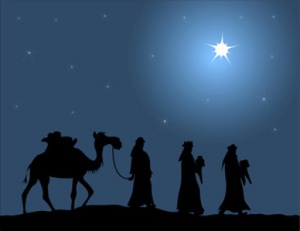St. Matthew’s Gospel account of the visit of the Magi that we hear on this Feast of the Epiphany of Our Lord brings to mind many images, most of them the creation of artistic renderings. A number of paintings and sculptures, songs and stories – even motion picture depictions of this event give rise to so many images that have become , at least in our culture, the accepted norms of how this event ‘unfolded’. We often think of three wise men, opulently dressed, arriving at the stable in Bethlehem to present their gifts of gold, frankincense and myrrh; often in the moment, they are presented as falling to their knees in awe and wonder, as if they have discovered some incredible and deep truth.
Too often, though, when we consider these stories from the gospel, we get so ‘hung up’ on the details – how many were they, what did they look like, where exactly in the ‘East’ did they come from – that we miss the central point of this portion of the ‘infancy narratives’. Although wise men, and apparently well-to-do at that (otherwise they would not have had an audience with King Herod), they are outsiders in terms of God’s Chosen People; they are not children of Israel. And yet, here they are, worshiping and adoring Christ the Lord, who has gone unnoticed by the majority of His own people. They are Gentiles, and their inclusion in this Gospel narrative points to the fact that the Saviour has come not just for the lost sheep of the house of Israel, but for all people, reconciling the entire human race to God the Father.
Yet, in this message that is certainly cause for gratitude and joy, we should reflect that even for these wise magi, God did not appear when and where they demanded or expected or even anticipated. They had to travel, led by signs, taking on a journey that would lead them from their homes and native regions – out of their comfort zone if you will – to arrive at a place and time of God’s choosing, where the Lord revealed Himself to them in the person of the infant Jesus. The revealing, or revelation was at the Lord’s discretion, not theirs. However, in taking this great journey, they illustrate their openness to receiving whatever message or sign that God wishes to impart upon them. They don’t ‘figure’ this mystery out; it is revealed to them.
We are invited to be like the magi in this story; too often perhaps we insist that God make His presence known to us when and where we decide, as if somehow it is within our power to ‘summon up’ the Almighty. God reveals Himself to us when and where we, like the Magi, are open to discovering Him. Often that means moving outside of our own comfort zones.
He is present to us, all the time, in all places, both the joyous and the difficult. It is really a question of whether or not we remain open to receiving the awareness of Him near to us, or whether we ignore Him in our midst. On this Feast of the Epiphany, we pray that in all places and at all times, we will seek the Lord where He may be found, and be open to witnessing His glory when and where He reveals Himself to us.
Praised be Jesus Christ, now and forever!

